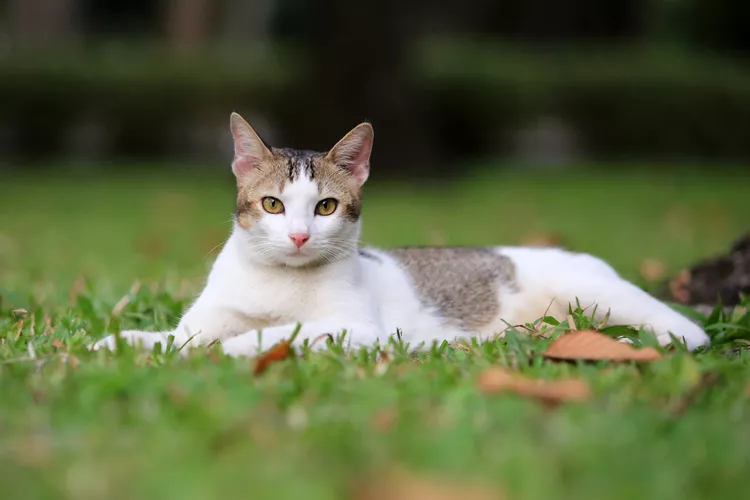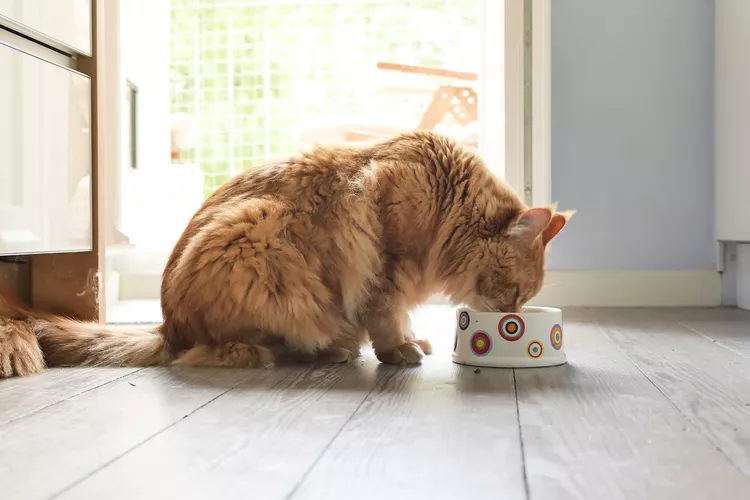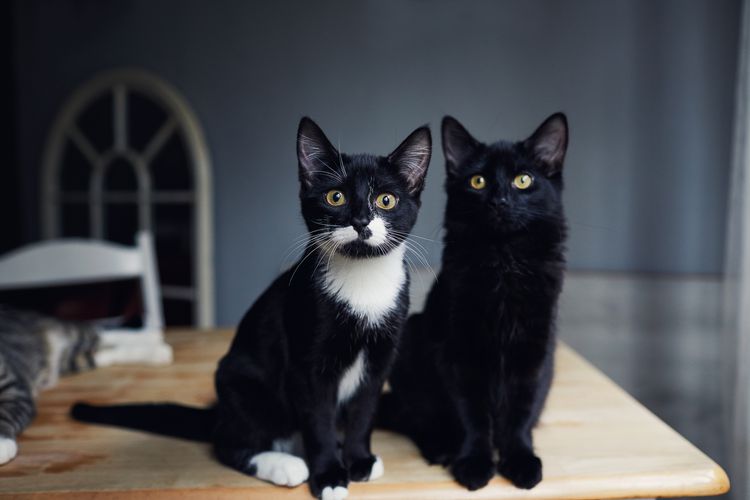
Humans have millions of sweat glands in their skin. These glands are concentrated in specific areas, such as the soles of the feet and armpits, and antiperspirants and deodorants are often applied to help manage the moisture and smell that is created. Cats, on the other hand, do not have sweat glands covering their body so it's often asked whether or not cats sweat. This bodily function may be a little different in cats than it is in humans but cats definitely do sweat.
Cats primarily sweat from the pads of their feet and from their noses where there are eccrine sweat glands. While there are technically sweat glands in the skin of a cat, these are different types of sweat glands called apocrine sweat glands. Apocrine sweat glands randomly secrete an oily substance in a cat that works like a pheromone.
The paw pads are where you may see sweat coming from your cat as they are walking across a hard floor or table. Damp footprints may be evidence of your cat sweating and may especially appear during warmer months and if your cat is stressed.
Sweating occurs in an attempt to keep your cat's body temperature normal or because your cat is stressed. Just like humans in the summertime, if a cat becomes too warm it will begin to sweat. When the sweat begins to evaporate, it provides a cooling sensation to the paw pads which may help lower the body temperature. But because the paw pads of cats do not take up a lot of surface area, it only provides a small amount of cooling power so cats use other means to cool off.
Cats may also sweat when they are stressed. This is often seen while your cat is at the veterinarian, traveling, or at home in a stressful situation if they jump onto a counter or table and leave damp paw prints behind.
Unlike dogs, cats do not pant unless they are very stressed, cannot breathe, or are extremely overheated. Panting is not an efficient way for a cat to cool its body off though, so if your cat is panting it may need immediate help with regulating its temperature, calming down, or breathing. Panting allows hot air from the chest to escape through the mouth but just like sweating, it is not an efficient means of cooling off a cat. A panting cat usually needs immediate veterinary attention and should not be ignored.
Cats have a normal body temperature between about 100 degrees and 102.5 degrees Fahrenheit. Sweating of the paw pads and potentially even panting may occur if a cat's body temperature gets over 102.5 degrees so these are important things to look for since it's no easy task to check your cat's temperature with a thermometer.
Since panting and sweating through the paw pads are not efficient methods to cool down, cats will often lick themselves to allow moisture to evaporate off their bodies. You may see this happen more often in warmer months when a cat may naturally be battling summer heat. This can provide a cooling effect and subsequently lower their body temperatures. But if you want to help your cat cool down there are also things you can do. Fans can be directed onto your cat to provide a cool breeze but you can also give your cat cold water to drink, place your cat in the shade, air conditioning, or on a cool surface like a tile floor, and as long as your cat doesn't hate water, give it a rinse of cool water or a large bowl to play in or with. Encouraging more play time at night rather than in the heat of the day can also help keep your cat cooler. Finally, if your cat has long hair, consider having it shaved if the summer heat is too much for it to bear.
If you think your cat is overheating, do not waste any time in attempting to cool it down while transporting it to your veterinarian. Seizures, permanent brain and organ damage, and even death can occur in cats if their body temperature gets too high for too long of a period of time.

The First 30 Days With Your New Kitten
The first month is full of changes and excitement for a kitten in a new home. Find out what to expect and what you can do for your new feline friend.
How Old Is Your Cat in Human Years?
As a cat ages, there are often behavioral and physical changes too. Find out how to convert cat years to human years and what to expect at each stage.
What to Buy for Your New Cat: A List of Essentials
Before you bring your new cat or kitten home, there are a number of things to collect or buy so your cat will feel welcomed like a family member.
Human Foods That Are Poisonous to Cats
Many human foods are toxic to cats. Avoid feeding cats table scraps. Instead, feed a nutritious cat food created for their specific nutritional needs.
Cat Food Ingredients to Avoid
When checking the nutrition content of cat food, look for ingredients that are not healthy or show it is of poor quality. Avoid these 3 ingredients.
Should You Feed Your Cat a Raw Diet?
Learn the pros and cons of raw diets for cats, and find out how to choose a raw food diet for your own cat.
Can Cats Eat Corn? Here's What A Vet Thinks
Corn is a common ingredient in cat food and can be a safe treat for cats when fed in moderation. Find out more about how to safely feed corn to your cat.
10 Obscure, Little-known Canine Facts in Honor of National Dog Day
With National Dog Day upon us, it's time to celebrate everything about our favorite pets—even the weirder stuff. Here are 10 obscure facts about dogs you probably didn't know.
The Different Types of Pet-Friendly Workplaces
Discover the different types of pet-friendly workplaces and the benefits they offer employees. Learn how to create a pet-friendly workplace and the best practices for pet owners.
Exploring the Different Types of Pet-Friendly Beaches
Are you looking for pet-friendly beaches? Learn about the different types of pet-friendly beaches, their locations, and tips for visiting them with your pet.
Why Is My Dog Lethargic?
Lethargy can be a sign that something is wrong with your dog. Find out what may be causing this lack of energy and what you should do about it.
Medications to Prevent Heartworm Disease for Dogs
Heartworm disease is a serious risk for all dogs exposed to mosquitos. Find out about the products used to prevent Heartworm disease in dogs.
Can My Dog Eat Tomatoes?
You'll want to keep Fido out of your garden since the tomato plant is toxic, but you can safely offer him ripe tomatoes as a nutrient-packed treat.
15 Best American Cat Breeds
Several cat breeds, including the American shorthair and Bengal, have their origins in the United States. Learn more about these American cat breeds.
Why Do Cats Slap Each Other?
Cats can have some quirky behaviors—one of them being slapping each other. Why do they do this and what can you do to stop it?
Skye Terrier: Dog Breed Characteristics & Care
Learn all about the Skye Terrier, an elegant breed known for its friendly and even-tempered personality with classic terrier traits.
Sloughi: Dog Breed Characteristics & Care
Learn all about the Sloughi, an ancient dog breed known for its impressive running ability, slim stature, and affection toward its family.
English Setter: Dog Breed Characteristics & Care
Learn about the English setter, an excellent hunting breed for pointing and retrieving game. It's also a popular and affectionate companion dog.
Why Dogs Bury Bones and Other Objects
If you give a dog a bone, he might bury it. Why is that? Learn about this burying behavior in dogs and what it means for your pet.
Reasons Why Dogs Run Away and How to Stop It
Dogs can escape, especially if they’re bored and not properly contained. Here are some techniques for stopping your dog from running away.